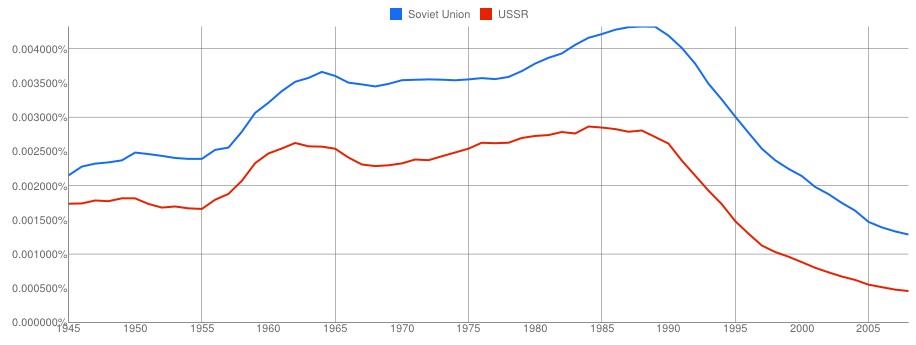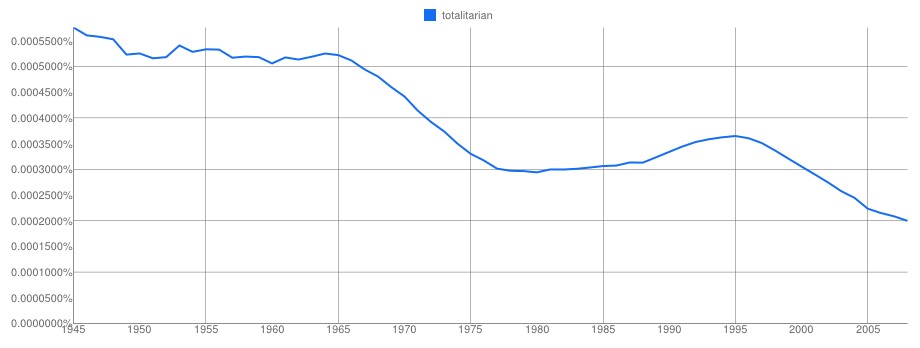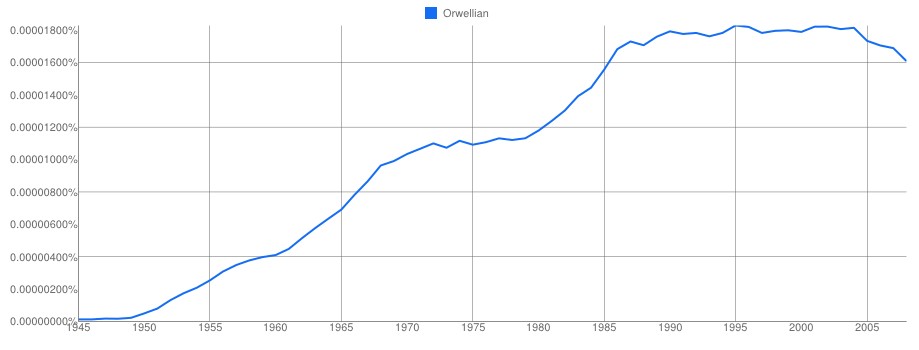Would it be Easier to Fight Surveillance if the Soviets Were Still Around?


Sometimes the constant news on the surveillance front makes me wonder: would it be easier to fight new surveillance programs if the Soviet Union were still around?
On the one hand the Cold War was a bonanza for the military and for our three-letter security agencies, which were invested with a mission of world-historical importance at a time when the nation was truly facing an existential threat (nuclear war). These agencies saw their budgets and powers expand dramatically in ways that were unprecedented in a country that had always held a deep suspicion of government power in general and “standing armies” in particular. With the fall of the Berlin Wall, these institutions faced an existential crisis of their own.
But these agencies don’t need the Cold War anymore—now they have the “War on Terrorism.” Although the threat posed by small groups of terrorists might seem to be of a much smaller magnitude, and the “existential threat” they are said to pose a stretch, 9/11 has allowed these agencies to keep their budgets inflated as effectively as the threat of Soviet domination and global nuclear annihilation ever did.
No, as a privacy advocate, I’m the one who finds himself wondering if I should be just a wee bit nostalgic for the Cold War.
As someone who campaigns against surveillance, having the USSR around might be kind of useful. Take, for example, the phone companies’ practice of retaining records of customers’ whereabouts, thus turning our phones into 24/7 tracking beacons. If the Soviets were around, I wonder if maybe everyone would say, “wait—that’s not American, that’s the kind of thing that the Soviets do!”
When gigantic companies focus on building dossiers of every citizen, gathering up as much information as they can get their hands upon, maybe people would say, “that sounds like what they do in East Germany!” If the Soviets were still here to kick around, maybe there would be a lot more attention paid to the question of just what kind of mass monitoring the NSA is engaged in.
Back in the USSR days, how much easier it would be to complain that we are allowing some of our most dearly held principles to yield to security imperatives and fade into irrelevance. Here are two cogent expressions of such values:
The right of the people to be secure in their persons, houses, papers, and effects, against unreasonable searches and seizures, shall not be violated.
The inviolability of the homes of citizens and privacy of correspondence are protected by law.
The first quote, of course, is the beginning of the Fourth Amendment to the U.S. Constitution. The second is from Article 28 of the 1936 Constitution of the Soviet Union. If the Soviets were around, we could point out that sometimes the first quote threatens to become as irrelevant as the second was.
Let’s be clear: I’m making a very narrow point here. The fall of the Berlin Wall and the end of the Soviet Union was one of the greatest, most joyful historical events of the 20th century. Every free-thinking human being rejoiced at the end of the nighmarish tyranny that the USSR represented. And, the Cold War inspired and justified an enormous and tragic amount of mischief by the United States, internationally and domestically. Furthermore, a lot of that mischief involved spying and surveillance and other privacy invasions, which the Soviet threat was used to justify.
But the USSR was not just an enemy; it was also a reference point. The Cold War led us to betray our own ideals in many ways, but despite all the spying it was used to justify, it is also true that to a great extent we defined ourselves during those years against the Soviet Union—they defined what we were not. Or at least, what we collectively told ourselves we did not want to be. While that didn’t prevent hypocrisy, I would argue that that collective definition did hold a lot of power; after all, most of those domestic abuses were kept secret for a reason. When the details came out, the result was the Church Commission and strong new protections against abuse. Today, while much (far too much) is still kept secret, there is nonetheless a stunning amount of detail on the public record about surveillance activities that are more befitting of the USSR than the USA. But where’s the outrage? Today, the checks and balances created during the Church Commission years are actually being weakened.
We do know that the Cold War gave impetus to some other campaigns to improve the status quo. The fact that the U.S. was competing for the loyalties of developing countries made our civil rights policies an embarassment, and led top establishment policymakers to lend more support to reform than they otherwise would have. Cold Warriors saw civil rights as a Cold War problem; even Richard Nixon (in his pre-Southern Strategy days) reflected that understanding, as when he told the nation, in a 1960 television ad, that civil rights should be supported not only “because it is right and just,” but also because
we cannot compete successfully with communism if we fail to utilize completely the minds and energies of all our citizens. And… the whole world is watching us. When we fail to grant equality to all, that makes news—bad news—for America all over the world.
If the Soviets were still around, harping on our surveillance hyocrisy as they did over our civil rights hypocrisy (despite being hypocrites themselves), perhaps the Very Serious People who run Washington today would, at the very least, be forced to give more thought to the rapid erosion of our privacy and the growth of unchecked surveillance power by our national security establishment.
Today, nobody is fixated on an overseas totalitarian state that had inspired George Orwell and stood as a standing warning about what happens when a society tilts too far toward constant surveillance, an inflated security establishment, an obsession with secrecy, and an absence of effective checks and balances. And as time passes, the Soviet Union will only get weaker as a reference point for those of us opposing surveillance infrastructures. For the interns working here in the ACLU offices this past summer, for example, the USSR is a purely historical entity (while Google and Facebook have been around for their entire adult lives).
Using Google’s handy and fascinating Ngram viewer, here’s a graph charting occurences of the terms “Soviet Union” and “USSR” in millions of books published between 1945 and 2008 (click here to see original on Google):

The end of the enemy
While we’re at it, a quick check shows even use of the term “totalitarian” is declining:

And while the Soviet Union is quickly fading as a dystopian reference point in surveillance policy debates, the world George Orwell created in 1984 seems to be doing better retaining its hold on our imagination. Here’s an Ngram of “Orwellian”:

Still, as a reference point for activists, there is no way Orwell’s fictional futurization of totalitarianism can compete with an overseas enemy embodying the real thing. Let’s hope our history teachers do their job in coming years, so that Americans never forget what we human beings are capable of (and perhaps even prone to), and so we can continue to experience a total surveillance society the way we’re supposed to—in the history books.

